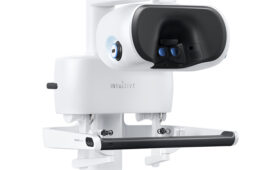
[Image courtesy of University of Houston]
Galveston National Laboratory tests on the filter found it killed 99.8% of SARS-CoV-2 virus in a single pass — as well as 99.9% of anthrax spores, according to the research, published today in the journal Materials Today Physics.
The researchers made the filter out of commercially available nickel foam heated to 200 °C (392 °F).
“This filter could be useful in airports and in airplanes, in office buildings, schools and cruise ships to stop the spread of COVID-19. … Its ability to help control the spread of the virus could be very useful for society,” said University of Houston physics professor Zhifeng Ren, the co-corresponding author for the paper and director of the Texas Center for Superconductivity.
Ren added in his news release statements that Medistar executives are proposing a desk-top model that could purify the air in an office worker’s immediate surroundings.
Seeking a virus-trapping or -killing air filter solution, Medistar sought help on March 31 from the Texas Center for Superconductivity. Ren and his colleagues came up with the idea of a heated air filter because SARS-CoV-2 can’t survive at temperatures above 70 °C (158 °F).
Ren suspected that nickel foam was a good materials solution because it is both porous, enabling airflow, and electrically conductive, enabling heating. Its flexibility helped with filter design.
One challenge with nickel foam was that it has low resistivity — making it hard to raise the temperature high enough to kill the virus. To solve the problem, the researchers folded the foam and connected multiple compartments with electrical wires to increase the resistance high enough to allow for heating.
Electrically heating the filter minimized the amount of escaped heat — preventing major strain on an air conditioning system, according to Ren. The research team says the filter meets conventional heating, ventilation and air conditioning (HVAC) system requirements.
“This novel biodefense indoor air protection technology offers the first-in-line prevention against environmentally mediated transmission of airborne SARS-CoV-2 and will be on the forefront of technologies available to combat the current pandemic and any future airborne biothreats in indoor environments,” said Dr. Faisal Cheema at the UH College of Medicine.
Medistar CEO Monzer Hourani and EVP Garrett Peel are calling for a phased roll-out of the device, “beginning with high-priority venues, where essential workers are at elevated risk of exposure (particularly schools, hospitals and health care facilities, as well as public transit environs such as airplanes).”




